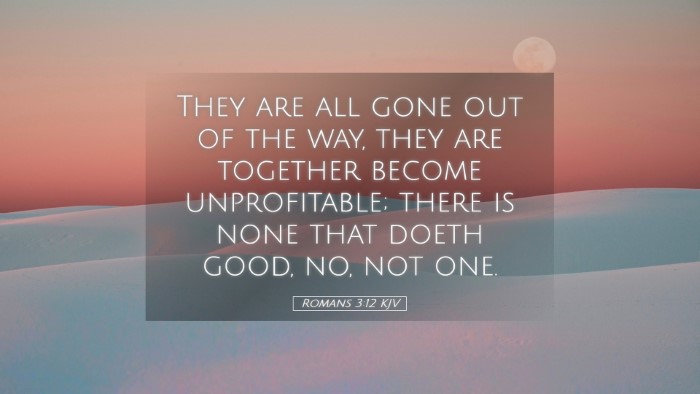Commentary on Romans 3:12
Text of the Verse: "They are all gone out of the way, they are together become unprofitable; there is none that doeth good, no, not one."
Introduction
The verse from Romans 3:12 serves as a pivotal point in Paul's epistle, showcasing the pervasive nature of sin among humanity. This commentary seeks to synthesize insights from various public domain commentaries to provide a comprehensive understanding suitable for pastors, students, theologians, and Bible scholars.
Contextual Background
To fully appreciate Romans 3:12, it is essential to grasp its context within the epistle. Paul is addressing the moral decay found within both Jews and Gentiles, asserting that all have sinned and fall short of the glory of God (Romans 3:23). This assertion leads to the need for redemption through faith in Jesus Christ.
The Nature of Humanity's Sinfulness
Paul's declaration that "all have gone out of the way" emphasizes the universal extent of human sinfulness. Each individual has deviated from the path ordained by God, leading to disobedience and moral failure.
- Matthew Henry's Insight: He elaborates on the meaning of "gone out of the way," suggesting that humanity's departure from God's commandments results in a life that is "unprofitable." Each person becomes spiritually bankrupt, with no good deeds to commend them to God.
- Albert Barnes' Perspective: Barnes highlights the collective failure of humanity, stating that when the text denotes "together become unprofitable," it points to the shared plight of all people. There is a stark equality in our need for salvation, regardless of societal status or religious heritage.
- Adam Clarke's Commentary: Clarke asserts that the use of "none" in relation to doing good signifies total depravity. It reflects the biblical doctrine that without divine intervention, humans are incapable of achieving righteousness on their own.
Theological Implications
This verse introduces several theological concepts integral to Christian doctrine:
- Total Depravity: The core notion here is that sin affects every facet of human nature. The consensus among the cited commentators is that there is no element of human effort that can restore our relationship with God without His grace.
- The Necessity of Grace: Since all have sinned and are deemed unprofitable, it necessitates the need for divine grace. Paul’s argument is not merely to condemn but to lead towards understanding the importance of faith in Christ as the only path to restoration.
- Equality in Sin: The universality of sin establishes that the need for salvation transcends cultural, ethnic, and moral distinctions. Henry, Barnes, and Clarke are unified in illustrating that all are equally in need of redemption.
Practical Applications
For pastors and theologians, Romans 3:12 provides a rich foundation for preaching and teaching about human sinfulness and the absolute necessity of grace:
- Humility in Ministry: Understanding this doctrine cultivates humility and compassion, as we recognize that no one is inherently better than another in terms of moral standing.
- Evangelistic Urgency: There exists a profound urgency in evangelism. The realization that all are lost without Christ presses the believer to share the gospel fervently with those in their sphere of influence.
- Encouragement for Believers: Acknowledging our past state of sin can provide profound encouragement and gratitude for the grace received through faith, serving as a reminder of the transformative power of the gospel in the lives of believers.
Conclusion
Romans 3:12 stands as a sobering reminder of the state of humanity apart from God’s grace. The insights from public domain commentaries reveal a consensus on the nature of sin and the necessity of redemption. By studying this verse, we are called to a deeper understanding of our need for Christ and the hope that arises from embracing the gospel message.
In light of these reflections, let this verse resonate within our hearts, prompting us not only to seek our own salvation but to fervently advocate for the salvation of others, holding fast to the truth that despite our unprofitability, God's grace abounds all the more.


